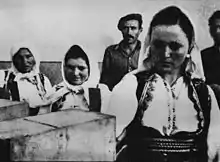
The Women's Antifascist Front of Macedonia (Macedonian: Антифашистички фронт на жените на Македонија, romanized: Antifašistički front na ženite na Makedonija; abbreviated АФЖ, AFŽ) was a World War II-era feminist movement in Macedonia and the predecessor to several present-day feminist organisations in North Macedonia. It was formed by volunteers along with other Women's Antifascist Fronts in Yugoslavia and was one of only four to also become an organised resistance movement.[1] The predecessors of the organization were the commissions for work with women of the Macedonian Communist Party found in the spring of 1943. They formed illegally the first committees in Kavadarci and Negotino in the Bulgarian occupation zone of Yugoslavia. The organization was officially founded on December 14, 1944 in Skopje, a month after the capture of the city in November. They published the magazine Makedonka (Macedonian woman), which was the first women's magazine published in Macedonian in Macedonia.[2]
The most prominent figure in the movement was Veselinka Malinska, a decorated World War II in Yugoslav Macedonia veteran and ASNOM participant.[2] The movement was closely affiliated with the Greek Civil War organisation, the National Liberation Front which had a substantial number of female partisans.
The AFŽ's main goal was to improve schooling for females and increase their literacy rate, as a majority of illiterates at the time were women.[3] The organisation, much like their allies, the National Liberation Front and the National Liberation Youth Association in Greek Macedonia, were labelled "bandits" by the Greek government following World War II.[4]
See also
References
- ↑ P. Ramet, Sabrina. (1999). Gender Politics in the Western Balkans: Women, Society and Politics in Yugoslavia and the Yugoslav Successor States. Penn State University Press. pp. 75-76. ISBN 978-0-271-01802-7. Google Book Search. Retrieved on July 14, 2009.
- 1 2 de Haan, F. Daskalova, K. Loutfi, A. (2006). A Biographical Dictionary of Women's Movements and Feminisms in Central, Eastern and Southern Europe: 19th and 20th Centuries. Central European University Press. pp. 296-300. ISBN 978-963-7326-39-4. Google Book Search. Retrieved on July 8, 2008.
- ↑ Trouton, R. (1952). Peasant Renaissance in Yugoslavia, 1900-1950: A Study of the Development of Yugoslav Peasant Society as Affected by Education. Routledge. p. 283. ISBN 0-415-17612-3. Google Book Search. Retrieved on July 8, 2008.
- ↑ "The Aegean part of Macedonia after the Balkan Wars". Council for Research into South-Eastern Europe of the Macedonian Academy of Sciences and Arts. 1996.